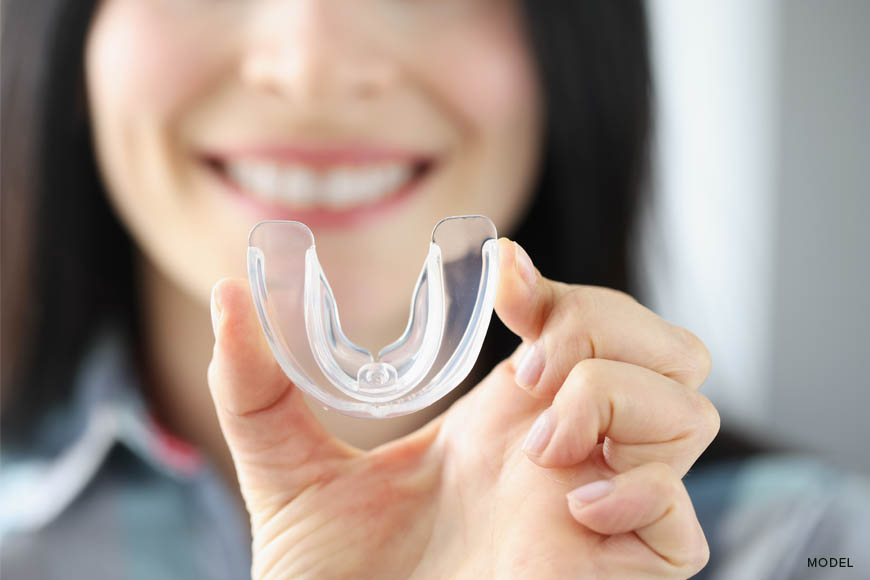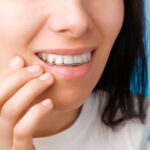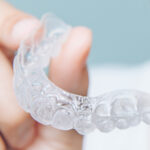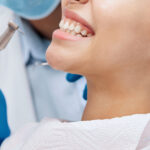Whenever the family sits down together to watch sports on weekends, you commonly see athletes wearing mouthguards. Athletes in basketball, boxing, soccer, hockey, and martial arts wear different types of mouthguards to prevent injuries and protect their mouth and jaw when they receive heavy contact.
Though best known to be essential for athletes, mouthguards aren’t exclusive to them alone. Mouthguards are also very useful for people in the early stages of developing an unhealthy oral habit. Wearing these mouth protectors help prevent a potentially serious dental problem in the future and effectively maintains the oral health of many kids and adults.
Do I Need a Mouth Guard?
Mouthguards have been proven effective in helping patients deal with various dental issues such as bruxism, which affects roughly 50% of children, 15% of adolescents, and 8% of adults. When not treated, bruxism could lead to problems like tension headaches and tooth damage when not treated immediately. Other common reasons that mouthguards can be useful are the following:
-
Teeth Grinding
Teeth grinding at night is one of the common symptoms of bruxism. If not treated, a patient could potentially break the enamel of their teeth over time. The use of a specific type of mouthguard commonly referred to as a nocturnal bite plate provides a barrier between the upper and lower set of teeth to prevent further damage and trauma to the patient’s teeth while sleeping.
-
Snoring and Sleep Apnea
Sleep apnea is a condition where the relaxation of the tongue and throat obstructs the airways, hindering the patient from getting a good night’s sleep. Depending on the doctor’s recommendation, they might use a type of mouthguards such as the Mandibular advancement device (MAD) or the Thornton Adjustable Positioner (TAP) to minimize the discomfort of sleep apnea.
-
Sports
Wearing a mouthguard can minimize the damage when an unfortunate instance of an unintentional collision occurs. Probably one of the most valuable pieces of equipment for both competitive athletes and people who casually enjoy recreational sports such as skateboarding, a mouthguard protects against broken teeth, cut lips, and other oral injuries. If a person is engaged in multiple sports, they will need a new mouthguard for each sports season.
Types of Mouthguards
When considering mouthguards, the first step is setting up an initial consultation with a dentist who will properly evaluate your teeth’ condition to determine which type of mouthguard is the most appropriate for your needs that will effectively protect your teeth. Some of the most common types of mouthguards are:
-
-
Stock Mouthguard
A stock mouthguard refers to a pre-molded or preformed type of mouthguard ready to be used by a patient. It is also one of the cheapest types of mouthguards in the market. As a result, it provides minimal protection to the teeth and would not be recommended for athletes performing at a high level or for patients who require a quality-made mouthguard to help with their oral issues.
-
Boil-and-Bite Mouthguard
Unlike stock mouthguards, Boil-and-Bite mouthguards provide slightly better protection for your teeth and can be bought at sporting goods stores. This type of mouthguard is made from thermoplastic material and would need to be submerged in hot water to soften before placing it in the mouth for shaping.
-
Custom Mouthguard
Perhaps the best type of mouthguards that all dentists recommend, custom mouthguards are perfect for athletes or patients who want a specifically made-to-fit mouthguard to help them achieve the highest level of protection against further damage to their teeth and overall oral health.
-
Can I Use A Mouthguard If I Wear Braces?
Absolutely. As much as we want to avoid any injuries, it is often unexpected, and it’s better to have protection, especially if the patient is wearing braces or other fixed appliances. Doctors can recommend a properly fitted mouthguard for patients with unique mouth work to have a barrier of protection around the mouth that wouldn’t get in the way of the braces’ progress.
Recent advancements in dentistry have also made it possible for athletes to get braces and still perform at the highest level without worrying about getting their braces knocked loose during competitions. Invisalign trays are highly recommended by doctors as an alternative to traditional braces since it is possible to wear this along with a mouthguard. Check-in with your dentist to explore your treatment options and see which approach is best for you.
How Are Custom Mouthguards Made?
Making a custom-made mouthguard is a two-appointment process. The first involves taking impressions of the teeth to create a model, then sending it to the laboratory where the model would be used as a reference to make a custom fit. Once the mouthguard is made, the dentist would ask the patient to come back to confirm if the mouthguard fits. During the second appointment, any final adjustments such as filing down any rough edges would also be made.
Can I Sleep With A Mouthguard?
While the whole process of getting used to sleeping with a mouthguard on will be an uncomfortable experience for most people, consistency is vital in this situation to incorporate the use of mouthguards into your nightly routine. You can definitely sleep with a mouthguard, but if you are uncomfortable while wearing your mouthguard, it’s highly recommended that you contact and schedule an appointment with your doctor so they can make the necessary adjustments to improve your sleeping experience.
Protect Your Teeth Today With A Custom Mouthguard
While regular visits to the dentist and good oral hygiene is excellent way to maintain a good set of teeth, you can improve this by getting a custom-fit mouthguard that will constantly provide you with protection even when you’re asleep.
Invest in your oral health and get a custom mouthguard now. Visit Madison Dentistry LLC. to experience a family-oriented style of dentistry carried out by board-certified doctors. Call 973-822-8003 to schedule a free initial consultation. No catch!




